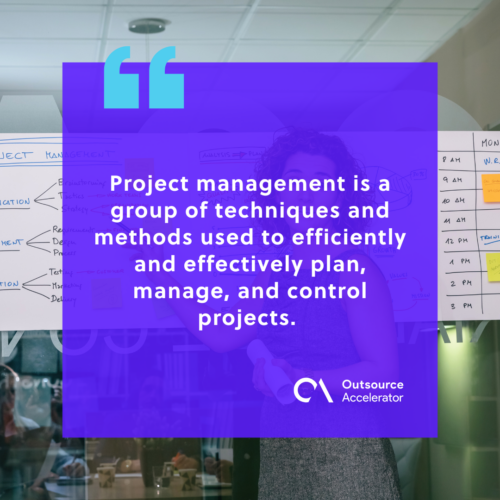7 types of project management your team can explore

Project management can look like many things, and achieving a project can already be a stressful endeavor. Teams should also consider whether they chose the right approach to tackling their project.
You see, there are many project management types, each with its own style and benefits. Experienced project managers can select an appropriate project management type, ensuring greater efficiency and reputation.
Project management is one role that can be outsourced to prominent outsourcing firms like DOXA. Its experience with providing capable offshore teams will be a gain for your company’s projects.
What is project management?
Project management is a group of techniques and methods used to efficiently and effectively plan, manage, and control projects.
It is an approach that promotes the development of a project team and a project plan. The goal is to see that all tasks are completed on time, within budget, and to the expected quality.
The project manager is responsible for determining project goals and requirements. This includes managing the resources required to achieve these goals as well as the project’s schedule and budget.
Overall, project management is a key part of business leadership, planning, and execution.

7 Types of project management
While there are many more project management types, we’ve outlined seven of the most commonly used.
Understanding these different types will help you determine what works best for your business.
1. Waterfall project management
The Waterfall project management type is a linear, sequential approach in which phases are completed in order with no return to previous ones. Its primary phases include planning, executing, controlling, and closing.
This is the most traditional form of project management and involves working through several distinct stages.
The main advantage of waterfall project management is that it provides clear responsibility lines between different phases and teams.
2. Agile project management
The Agile project management type is a framework for managing and delivering projects. It emphasizes responding to change, working productively and efficiently, and producing incremental customer value.
Agile methods have been described as an alternative to more traditional project management types. Those methods rely more on extensive documentation and plan-based scheduling, while Agile is more flexible.
3. Scrum project management
Scrum is a type of project management that uses short iterations, or sprints, to create deliverables on a fixed schedule.
In Scrum, you move from one sprint to another in two-week cycles. Each sprint starts with planning and ends with review and retrospective meetings.
Scrum teams are self-organizing and cross-functional, with all the skills needed to complete specific tasks.
The Scrum manager ensures that specific principles are practiced for the project’s duration.
4. Kanban project management
The Kanban project management type is a visual system that helps organize projects. It’s designed to let you know what tasks are being worked on and when they’ll be completed.
Cards represent each task and are placed on a board. As the project progresses, cards are moved between columns. For example, moving a task card from “To Do” to “Ongoing.”
Kanban’s benefit is it helps teams make sure they’re always working on the most important tasks at any given time.
5. Lean project management
Lean maximizes productivity by eliminating waste in processes and improving efficiency. Continuous improvement allows you to improve processes and eliminate unnecessary steps along the way.
It also emphasizes that projects should start with the end in mind. In other words, identify your goal before getting started on the project.
The goal is to ensure that only essential features are developed for a product or service. Waste, such as unnecessary meetings, paperwork, and poorly defined requirements, are reduced.
6. Six Sigma project management
Six Sigma project management ensures projects are completed with high quality and low cost.
This is among the project management types that use statistical methods to identify defects and errors in a process, correcting them before they become a problem.
The term “Six Sigma” refers to a statistical measure of the number of defects in a process, which must be reduced to 3.4 or fewer per million.
The idea is that defects are inevitable but should be limited to 3.4 parts per million (PPM) or less ( roughly one defect per every 34 million units).
7. PRINCE2 project management
PRINCE2 stands for Projects in Controlled Environments. It guides you through project management from start to finish. It is used in both the public and private sectors but is especially popular in the UK.
Its common features include a systematic approach to project management that covers all the areas from start to finish, ensuring quality.
Specific documentation is used to manage the project. There’s also a clear set of guidelines to evaluate your work.
Find flexible project managers through DOXA
DOXA ensures that there are no boundaries to finding a highly-skilled, competitive workforce. It ensures that your outsourced project managers can connect effectively with your business culture and values.
Hiring project managers sourced by DOXA will save you up to 70% compared to hiring local talent. You can take full advantage of DOXA’s resources and infrastructure while you direct your offshored team.
Kickstart your project management’s success with DOXA today!








 Independent
Independent




